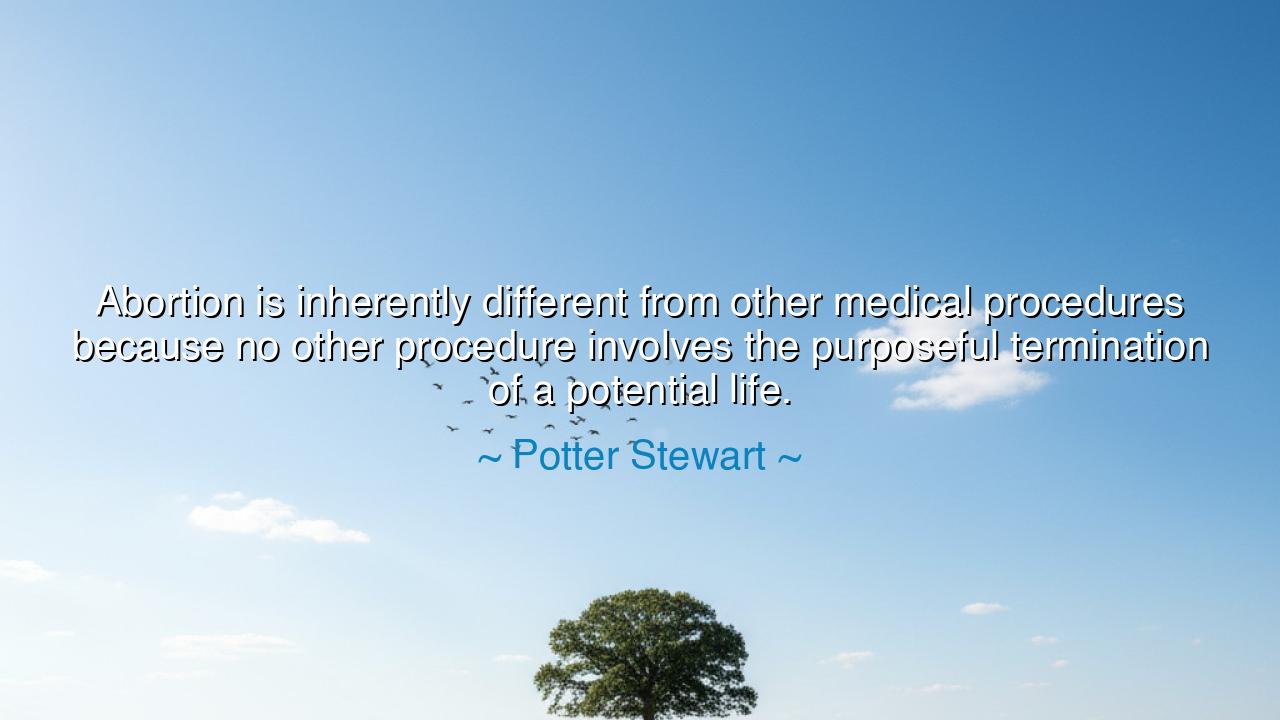
Abortion is inherently different from other medical procedures
Abortion is inherently different from other medical procedures because no other procedure involves the purposeful termination of a potential life.






Hear now the solemn words of Potter Stewart, Justice of the Supreme Court of the United States, who declared: “Abortion is inherently different from other medical procedures because no other procedure involves the purposeful termination of a potential life.” These words are not spoken lightly, nor are they shaped merely by legal reasoning—they echo with the weight of history, morality, and the unending conflict of conscience that has followed humankind since the dawn of civilization. In this statement lies both clarity and burden: that while medicine often seeks to preserve life, here it must contend with the decision to end what could become life.
The origin of this saying lies in the tumultuous era of the early 1970s, when the question of abortion rose before the Supreme Court in cases such as Roe v. Wade. Justice Stewart, in deliberating, wrestled with the uniqueness of abortion compared to other treatments. A surgery may heal the body, a medicine may cure disease, but abortion, he noted, confronts society with a profound paradox: the intersection of the autonomy of the mother with the existence of a potential life within her. His words were less an argument for one side or the other, but rather a recognition of the gravity and singularity of the issue.
To say that abortion is inherently different is to point out that it cannot be judged in the same manner as removing a tumor or repairing a heart. Those procedures address sickness, injury, or disease. Abortion, however, is bound up with the moral and philosophical question of when life begins, and whether society recognizes that potential life as having claims of its own. Thus, Stewart’s statement does not end the debate, but situates it in its proper seriousness: this is not a decision of mere biology, but of humanity, justice, and ethics.
History itself bears witness to the conflict. In ancient Rome, abortion was practiced yet largely unregulated, a matter often left to the household. In medieval Christendom, it became condemned as sin, as the Church debated when the soul entered the body. In modern times, nations have divided—some recognizing the procedure as a woman’s right to choose, others restricting it in defense of the unborn. The recurring theme across centuries is this: abortion is never treated with the same moral neutrality as other medical procedures, for it always touches upon the sacred question of life itself.
Consider the real story of Dr. Bernard Nathanson, once a leading advocate of abortion rights, who later turned against the practice after reflecting on the reality of fetal development and the meaning of life. His transformation illustrates the profound weight of Stewart’s observation—that abortion, unlike other forms of medicine, is not merely a technical act, but one that forces society to reckon with competing values of freedom, compassion, and the sanctity of life. Whether one agrees with Nathanson or not, his story shows how deeply abortion can stir human conscience in ways that heart surgery or dentistry never could.
The deeper meaning of Stewart’s words lies in the call for humility. Whether one supports or opposes abortion, to recognize it as different is to admit that it deserves careful thought, profound respect, and deep moral consideration. It is not to be trivialized as routine, nor dismissed as mere politics, for it involves the fate of both mother and child, freedom and potential, autonomy and life.
The lesson is clear: in facing questions of such gravity, society must cultivate compassion, honesty, and humility. Practical actions follow: engage in dialogue without hatred, consider perspectives not your own, and support policies that uphold both human dignity and human need. For the issue of abortion will never be solved by anger or dismissal, but only by respect for the profound truth that life—whether present or potential—is sacred.
Thus let Stewart’s words endure: “Abortion is inherently different… because no other procedure involves the purposeful termination of a potential life.” Carry them not as a judgment, but as a reminder that some choices in life touch the deepest chords of human morality. And when faced with such choices, let us walk carefully, with reverence, compassion, and truth.






AAdministratorAdministrator
Welcome, honored guests. Please leave a comment, we will respond soon